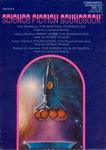
 Science Fiction Soundbook
Science Fiction Soundbook
By Ray Bradbury, Isaac Asimov, and Robert A. Heinlein
Read By Leonard Nimoy and William Shatner
4 hours – 4 Cassettes [UNABRIDGED]
Publisher: Caedmon
Published: 1977
Themes: / Science Fiction / Mars / Edgar Allan Poe / Computers / Mathematics / Sociology / Space Travel /
This out-of-print Caedmon set was a wonderful find (thanks, Esther!) because it contains two cassettes (four stories) that are amongst the earliest science fiction audio I ever heard. The stories are “The Green Hills of Earth” and “Gentlemen, Be Seated” by Robert A. Heinlein, and “There Come Soft Rains” and “Usher II” by Ray Bradbury, all read by Leonard Nimoy. Also included here is “The Psychohistorians” by Isaac Asimov and “Mimsy Are the Borogroves” by Henry Kuttner, both read by William Shatner. The audio was originally published in 1977.
I found Leonard Nimoy’s readings to be excellent. In Bradbury’s “Usher II”, he delivers a passionate speech about the evils of book burning with perfection. In “Gentlemen, Be Seated” and “The Green Hills of Earth” he portrays working class spacemen with complete success.
William Shatner, though, was disappointing. I’ve heard him read some Star Trek titles, and felt his delivery was pretty good, but here, on both cassettes, he reads as if he needs to be across town in fifteen minutes. He zips through the text, sometimes fast enough to affect my comprehension.
The stories are all bona-fide 5-star classics:
“There Will Come Soft Rains” by Ray Bradbury, read by Leonard Nimoy
This famous story is about a house. That’s it, just a house. An automatic, programmed house that keeps running and running… but where are its inhabitants? Bradbury manages to tell a very human tale without any actual people.
“Usher II” by Ray Bradbury, read by Leonard Nimoy
A fantastic story, passionately read, about a man who builds Poe’s House of Usher on Mars. Because of the social climate on Earth, it would be illegal to build such a fantastic structure, because stories of fantasy are simply no longer allowed. If you agree with that policy, this fellow would be happy to show you around, and he does get that opportunity. As I mentioned earlier, a highlight is a speech on censorship that was an obvious precursor to Bradbury’s Fahrenheit 451.
“The Psychohistorians” by Isaac Asimov, read by William Shatner
This is the first novelette in the first book of Asimov’s Foundation trilogy. In it, you meet Hari Seldon and Gaal Dornick in an introduction to some of the key elements of the Foundation story, including the Empire in decline and the mathematics of psychohistory. However, I did have difficulty get into Shatner’s narration.
“The Green Hills of Earth” by Robert A. Heinlein, read by Leonard Nimoy
Rhysling is a Spacer who lost his eyesight in a reactor pile accident. Now, he’s a famous bard, and this is his story. The story is an excellent portrayal of what spaceflight might be like from the working stiff’s point of view, once flight becomes common. At least from the perspective of a science fiction writer in 1948. No NASA engineers here.
“Gentlemen, Be Seated” by Robert A. Heinlein, read by Leonard Nimoy
This story is similar to “Green Hills” in that the characters are working class spacemen. One agrees to take a reporter through some new buildings on the moon (yes, he does get overtime pay for it), but an accident occurs during the tour. Another story from the late 1940’s, which is the part of Heinlein’s long career that I enjoy most.
“Mimsy Were the Borogroves” by Henry Kuttner, read by William Shatner
This story fared better under Shatner’s cadence than did “The Psychohistorians”. I was captured by it within 5 minutes or so of concentrated listening, and Kuttner’s story held my attention even when Shatner didn’t. The story involves some toys that were sent back in time by a far-future scientist with too much time on his hands. The toys are found by some kids, who play with them, and are changed by them. The story plays with the ideas of how people think – how kids think, how adults think, and how it could possibly be different. I found it a well-written and entertaining exploration of these ideas. Great science fiction.
Posted by Scott D. Danielson

Is there available a reading on CD of Usher II by Vincent Price and Leonard Nimoy originally performed in the 70’s